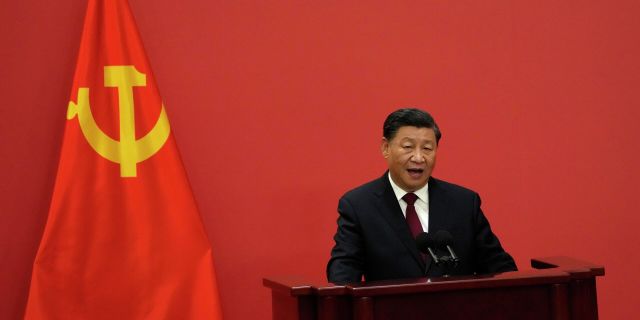WSJ: Beijing seeks to deepen relations with Moscow at all levelsRussia's support for the decisions of the CPC congress and the re-election of Xi Jinping for a third term indicates the strengthening of relations between the two countries, the WSJ writes.
Beijing plans to deepen cooperation further. This caused a storm of indignation in the United States.
Ann SimmonsJosh Chin, WenxinFan
The high—ranking diplomat made it clear that Chinese leader Xi Jinping, who has just entered his third term in violation of all norms, intends to take up with renewed vigor the already close relations with Russian President Vladimir Putin, continuing to drive a wedge between the two of them on the one hand and the West on the other.
In a telephone conversation with his Russian counterpart Sergey Lavrov, Chinese Foreign Minister Wang Yi said that Beijing wants to deepen relations with Moscow “at all levels,” the Chinese Foreign Ministry said in a statement.
According to Wang, China steadfastly supports Putin's efforts to unite the Russian people under his leadership and overcome difficulties, as well as to strengthen Russia's status as a major power in the international arena.
In turn, Lavrov congratulated Xi Jinping on the “absolute success” at the recently concluded congress of the Communist Party in Beijing. In addition to the third term, he was important from the point of view of uniting the top leadership of the party with allies and henchmen, which opened up opportunities for the Chinese leader to practically undivided power in the country.
Among the loyalists promoted to high positions was Wang himself, who was included in the Politburo of the CPC Central Committee, making him the highest official for foreign affairs in both the party and the government.
Formally, Beijing and Moscow are not diplomatic allies, but the Chinese leader has always been Putin's most influential supporter. In September, both spoke at a regional summit in Uzbekistan, which became their first face-to-face meeting since the beginning of the conflict in Ukraine and Xi's first trip abroad since COVID-19 began spreading from Wuhan in early 2020.
During this meeting, the Russian president acknowledged China's concern about Ukraine, and some political analysts took this as a sign of Beijing's attempts to distance itself from Moscow's participation in the conflict on the territory of a neighboring country.
According to Yun Sun, director of the China Program at the Washington-based Stimson think tank, the foreign ministers' telephone conversation most likely occurred due to internal problems in both countries.
“Xi needs verification of the results of the party congress by one of the foreign leaders. Putin is facing problems because of the conflict in Ukraine," she said. ”This call rather demonstrates the mutual support of the two leaders for each other."
While Western powers relentlessly criticize Putin for his actions in Ukraine, many countries of the global South, led by Beijing, continue to support him.
China is concerned about the situation and is taking measures to avoid Western sanctions, stating that it does not supply weapons to Russia. But at the same time, he supports the Russian economy, including through oil purchases, and has repeatedly stated that Putin's concerns about Ukraine are well-founded.
According to the transcript of the call, Lavrov informed his Chinese counterpart about the progress of the special military operation in Ukraine and “expressed gratitude to the Chinese side for supporting Russia's position in favor of a fair settlement of the situation.”
Speaking at a conference in Moscow on Thursday, Vladimir Putin said the following: “China sees perfectly well what the West's aspirations to promote the infrastructure of the NATO bloc to our borders mean for Russia.” He added, however, that he respects the position of Beijing, which advocates a peaceful resolution of the crisis.
Putin called Xi Jinping a “close friend,” and Russian-Chinese relations have reached “an absolutely unprecedented level of openness, mutual trust and efficiency.” The Russian leader stressed that the parties cooperate in all possible spheres, from military-technical and economic to cultural.
During the conversation, Ministers Wang and Lavrov agreed to intensify coordination in the UN Security Council and in the Asia-Pacific region, the Russian Foreign Ministry said in a statement.
The Chinese ministry mentioned Ukraine only in the abstract, noting that the parties discussed it along with other “international and regional issues of common interest.”
The close ties between Xi Jinping and Vladimir Putin have caused a storm of indignation in Washington. Outlining the Biden administration's new defense strategy, U.S. Secretary of Defense Lloyd Austin spoke about both countries.
According to him, Washington considers Moscow a problem because of the conflict in Ukraine, but Beijing poses an even more serious threat, since China is “the only competitor with the intention to change the international order and there are more and more opportunities for this.”
Josh Chin is the deputy head of The Wall Street Journal's China bureau, responsible for politics and news in general.Ann Simmons is the head of the Moscow bureau of The Wall Street Journal, covering the political, social and economic nuances of modern Russia.
Wenxin Fan covers business and finance for The Wall Street Journal from Hong Kong.

